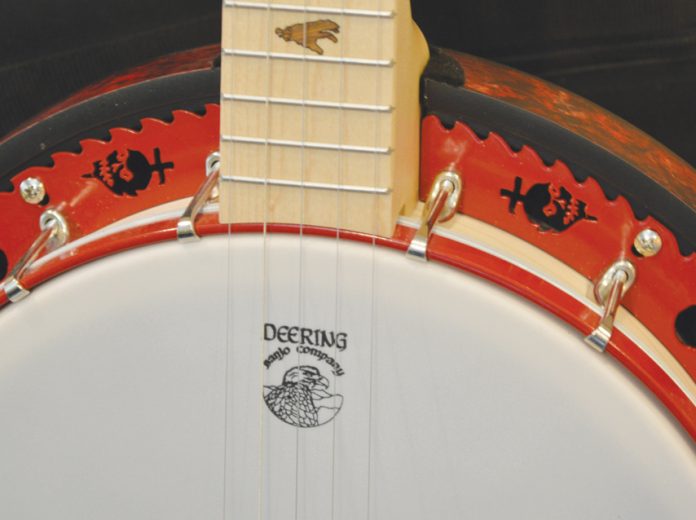At the age of two, his father began teaching him the crafts of an artisan. He built his first model airplane at age five and received his first drafter tools at seven. When 14, he fell in love with the music of the Kingston Trio and the Vega Pete Seeger Banjo, and his wife at the age of 19. A few years later, Deering, The Great American Banjo Company was born.
At the age of two, his father began teaching him the crafts of an artisan. He built his first model airplane at age five and received his first drafter tools at seven. When 14, he fell in love with the music of the Kingston Trio and the Vega Pete Seeger Banjo, and his wife at the age of 19. A few years later, Deering, The Great American Banjo Company was born.
Now, Greg and Janet Deering, founders of the Deering Banjo Company in Spring Valley have 42 specialized employees, generate more than $4.3 million a year, and create around 200 banjos a week delivered around the world.
“We started by osmosis,” said Greg Deering. “I had a lot of training growing up. But my dad was not an instrument maker he was an aircraft engineer. My dad taught me well, to think about design because he said craftsmanship is not in your hands, it’s in your mind.”
Walking through his workshop, he said the quality of its product comes from the people who take great pride in what they do.
“Of course they have to work well with their hands,” he said. “But what I look for most in an employee is honesty, integrity and a strong work ethic. We wouldn’t be where we are today without their dedication in constantly growing their skills and desire to create the best product at every step of the process.”
His desire to own a banjo, when Greg Deering went to college he took a wood shop class. In class, he found a couple of people interested in building instruments and they opened a shop in 1970, the American Dream Co-op in Lemon Grove.
“I finagled my way in,” he said. “I just started showing up the day they moved in, helped them and the next think I knew I was working with them. So in May in 1970, I was building professionally.”
When he met his wife Janet, he said they were always friends and talked about owning a business together and partly what brought them together as a couple. It was not always an easy road, said Greg Deering, but all the experiences, both good and bad brought Deering to where it is today.
After marriage, Janet Deering had a job in Washington D.C., so they left. One of the people working at the American Dream was Bob Taylor and together they were getting most of the work done so after his departure, the owner could not pay the bills.
“Bob and his partner bought him out and started Taylor Guitars,” said Greg Deering. “When we came back into town, I began working with Bob doing repair work and people started bringing banjos in, so instead of me paying them 20 percent, they were paying me 20 percent—and we were starving.”
Jeff Stalling came to them and formed a partnership and they started making banjos. After six months of work, Stalling said he no longer wanted to partner. They dissolved the partnership and created Deering Banjo Company. In 1977, Stalling decided he did not like the business arrangement and cut orders in half.
“I sat up all night and made a dulcimer,” said Greg Deering. “Got my guys making dulcimers sent them out with them and we just kept on going. Jeff didn’t like that. On the day before Thanksgiving 1977, he gave us 30 days to get out of the building and he hired our staff right out from under us.”
But what Stalling did not realize is that the equipment belonged to the Deerings. They bought a house across the street and started over. With their first few production models, they went to a trade show in 1978 and started selling products on a nationwide basis.
“Unlike Stalling, I always believed we had to be efficient, cost effective and really earn our profit and give good value to our customers,” said Greg Deering. “At times, that has probably hurt our profit margin, but it is the real honest, honorable way to run a business. Just making a product and thinking you can charge any price you want just isn’t in our genes. We make banjos today that are half the cost of competitors in our business and our quality is higher.”
About 16 years ago, the ownership of Vega Banjo fell into their laps, said Greg Deering, so they now make Vega Banjos. Finally, he received his dream banjo, but he had to make it himself.
Greg Deering still gives credit of his success to his father.
“My dad never let me use his power tools, but he always gave me good hand tools and taught me how to use them,” he said. “He held a piece of sandpaper in his had once and said, ‘I know you don’t want to hear this, but you can do a good job building it but if you don’t do a good job finishing it, it won’t be worth a damn,’”, he said. “’so this piece of sandpaper is one of the most important tools you will ever have.’”
Though much of their products now go through an automated production product, it still creates custom banjos by hand on request. He said the banjo market is expanding.
“It used to be all bluegrass, folk and a little jazz, but in the past two years it has crossed all cultural boundaries in almost every type of music,” he said.















Hello everybody, here every
Hello everybody, here every person is sharing such experience,
therefore it’s nice to read this webpage, and I
used to pay a visit this webpage everyday. http://agapelove.jgospel.net/UserProfile/tabid/1241/UserID/164509/Default.aspx
Hello everybody, here every
Hello everybody, here every person is sharing such experience, therefore it’s nice to read
this webpage, and I used to pay a visit this webpage everyday. http://agapelove.jgospel.net/UserProfile/tabid/1241/UserID/164509/Default.aspx